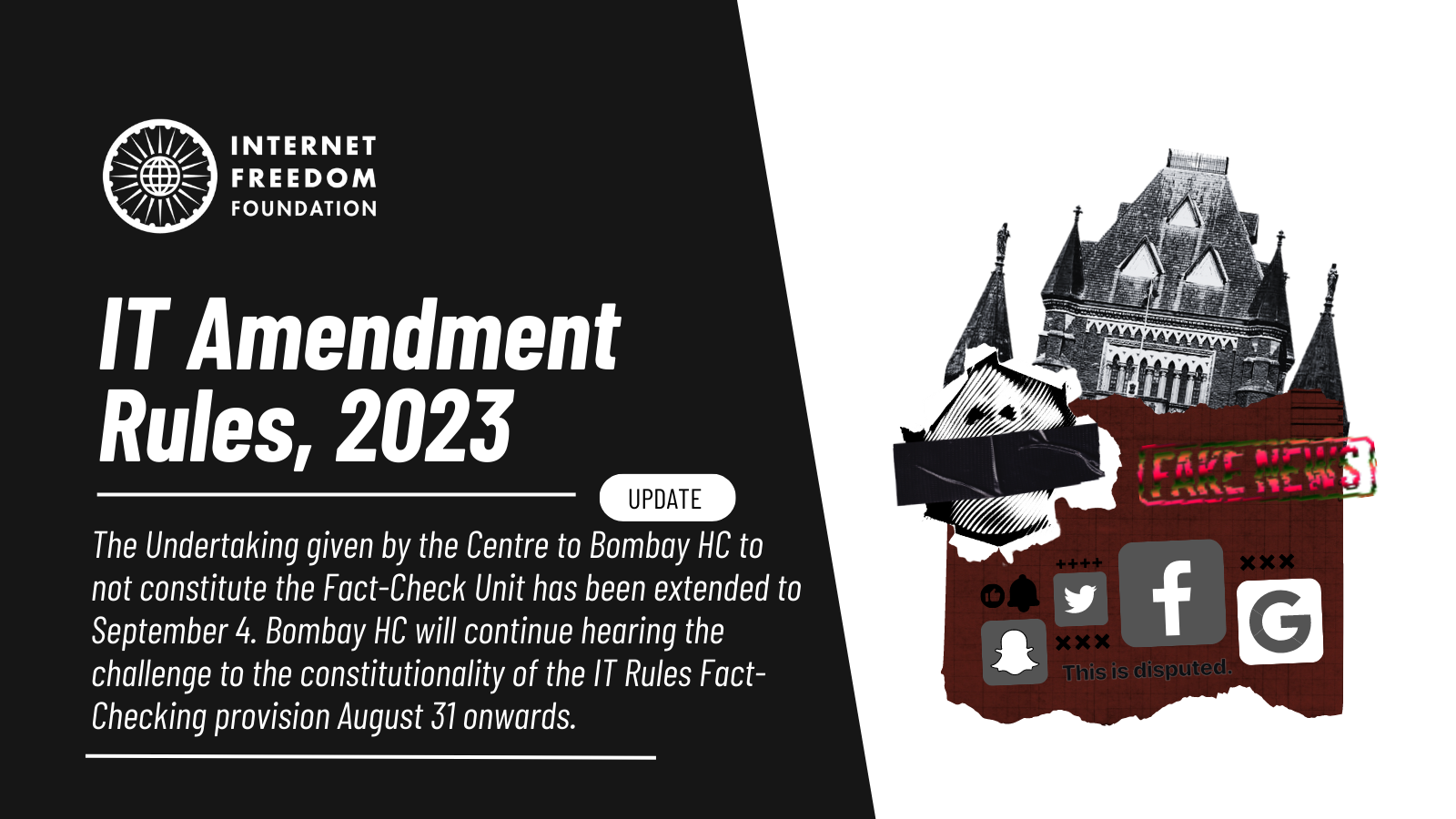
Tl;dr
The Ministry of Electronics and Information Technology (MeitY) notified the Information Technology (Intermediary Guidelines and Digital Media Ethics Code) Amendment Rules, 2023 (IT Amendment Rules, 2023) on April 6, 2023. These rules include a provision that permits a "fact check unit of the Central Government" to determine the falsity or misleading nature of any online content related to the "business of the Central Government" and demand its removal from the internet. Mr. Kunal Kamra, a political satirist and standup artist, the Editors Guild of India, and the Association of Indian Magazines have filed writ petitions before the Bombay High Court challenging the constitutionality of this provision. The Petitioners have now concluded their submissions, and the undertaking given by the Union Government to the Court to not constitute a Fact-Check Unit in the interim has been extended to September 4, 2023. IFF has provided legal assistance in the matter to Kunal Kamra as well as the Association of Indian Magazines.
Why should you care?
The IT Amendment Rules, 2023 bring about significant changes to Rule 3(1)(b)(v) of the IT Rules, 2021, which specifically address the responsibilities of intermediaries. These amendments now impose an obligation on intermediaries to make "reasonable efforts" in preventing their users from uploading or sharing any information related to the Central Government that is considered "fake, false, or misleading." The determination of such content will be solely made by a “Fact-Check Unit” appointed by the Central Government itself. Failure to comply with these due diligence requirements puts intermediaries at the risk of losing their safe harbour protection provided under Section 79 of the IT Act, 2000. In such circumstances, the intermediaries would be more likely to protect their own commercial interests, even if it is at the cost of curbing their users’ right to freedom of speech and expression.
Though the IT Rules, 2021, already granted increased authority to the government over social media intermediaries, OTT platforms, and digital news media platforms, these recently introduced amendments to the IT Rules, 2021 further expand its powers to censor content that is considered fake, false, or misleading. This heightened level of regulation has the potential for misuse and poses a significant threat to press freedom in India as it could lead to increased censorship.
Proceedings before the Bombay High Court
In June 2023, the Bombay High Court had directed for all the petitions to be listed on July 6 and 7, 2023, for final hearing. The Petitioners were asked to commence, and accordingly, Senior Advocate Navroz Seervai made his submissions on behalf of Kunal Kamra. In his arguments, highlighted that the intermediaries had no interest in retaining potentially problematic material at the risk of losing their safe harbour protection, which could lead to over-censorship as intermediaries would excessively restrict content to avoid litigation, thereby violating the freedom of speech and express guaranteed under Article 19(1)(a) of the Constitution.
Seervai further argued that false speech was not a ground to restrict Article 19(1)(a), and that the Centre’s affidavit failed to provide concrete examples of misinformation about the government causing significant harm. He suggested that if there is misinformation, then the government can simply clarify the truth. He further pointed out that the Centre’s affidavit did not address how the government could act as a judge in its own cause and that it failed to demonstrate that the impugned Rules adhered to the inviolable principles of natural justice.
It was also submitted by Seervai that the issue resided in the Fact-Check Unit’s authority to determine what was false or true. He stated that creating such a binary distinction would destroy something like “satirical speech”.
Mr. Gautam Bhatia appeared before the Bombay High Court on behalf of the Association of Indian Magazines and submitted that the government was not the arbiter of truth, and could not be permitted to make a distinction between high value speech or low value speech by way of its own executive action. He further noted that right to free speech in India could be construed to be broader than right to free speech in the United States as the latter was absolute and allowed for Courts to carve out exceptions, while the former was restricted to only the grounds enumerated in Article 19(2).
Bhatia also submitted that there was an indirect element of coercion hidden in the amendment as non-compliance with an FCU’s order or not employing “reasonable efforts” to ensure that content prohibited under Rule 3(1)(b) of the IT Rules, 2021, was not present on its platform would lead to an intermediary losing its safe harbour as per Rule 7 of the IT Rules, 2021. He concluded his arguments by stating that this would lead to intermediaries prioritizing their commercial interests over the right to free speech and expression of their users.
With the Petitioners having concluded their arguments, the matter will now be heard on August 31, 2023 and September 1, 2023. The Respondent, i.e. Union of India, led by Solicitor-General Tushar Mehta, will be making submissions. The undertaking previously provided by the Government not to constitute the Fact-Check Unit has been extended to September 4, 2023.
We will continue to provide legal support to Mr. Kunal Kamra and the Association of Indian Magazines in their efforts to protect the right to speech and privacy of Indians on the internet. We are immensely grateful to Sr. Adv. Navroz Seervai and Adv. Gautam Bhatia for leading us in the matter. They were assisted by Advocates Arti Raghavan, Meenaz Kakalia, Aditi Saxena, and the legal team from IFF comprising Gautam Bhatia, Vrinda Bhandari, Abhinav Sekhri, Tanmay Singh, Radhika Roy and Gayatri Malhotra.
Important Documents
1. Writ Petition in Association of Indian Magazines v. Union of India. (link)
2. Writ Petition in Kunal Kamra v. Union of India. (link)
3. Written note filed in Association of Indian Magazines. (link)
4. Previous blog post on the petition filed by Association of Indian Magazines, titled “In a petition filed by the Association of Indian Magazines challenging the fact check amendments to the IT Rules, 2021, the Bombay High Court directs the Government to file its Reply”. (link)
5. Previous blog post on relating to challenge to the IT Rules, 2023, titled “In Kunal Kamra’s Petition in the Bombay High Court, the Government undertakes not to constitute its Fact Check Unit”. (link)
6. Skeletal submissions on behalf of Union of India in the matter. (link)
7. Reply by Union of India in Association of Indian Magazines v. Union of India. (link)
8. Reply by Union of India in Kunal Kumra v. Union of India. (link)

